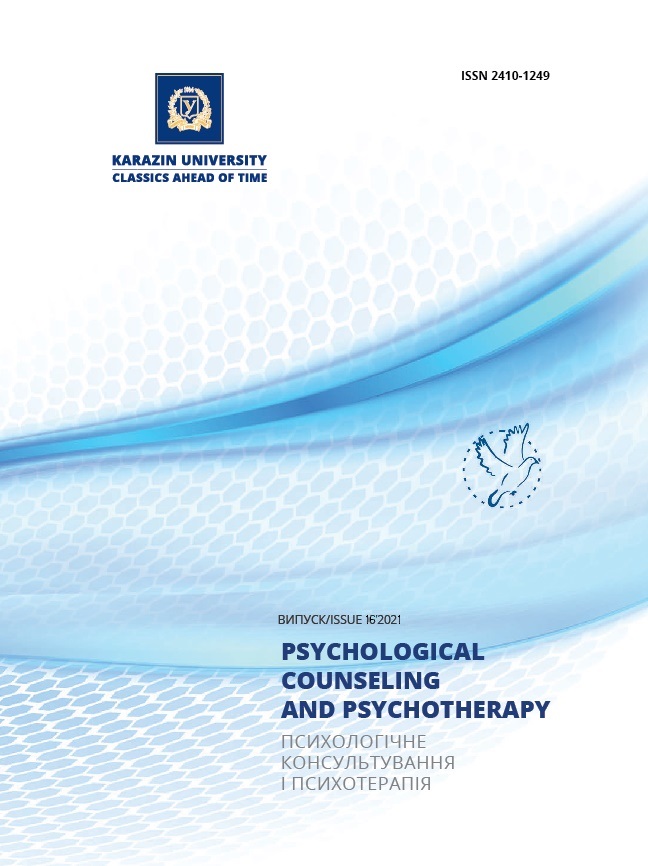Experiencing and Coping with Trauma in Warfare and Military Conflicts
Abstract
The article investigates the methods of treatment of post-traumatic stress disorders in war and military conflicts. In modern psychiatry and clinical psychology, an externally conditioned mental disorder has been introduced - a kind of scientific acceptance that has not previously been used in the classification systems of mental disorders. Particular attention is paid to the new diagnostic manual ICD-11-CM (International Classification of Diseases, 11 Revision, Clinical Modification), which comes into force on 01.01.2022, which brings great innovations, especially in the diagnosis of injuries. It will also affect possible medical procedures and therapeutic interventions. Therefore, in the next few years there will be a major change in the paradigm of treatment. It is noted that an expert survey of the International Society for Traumatic Stress Research on Best Practices in the Treatment of Complex Post-Traumatic Stress, which interviewed 50 international experts, showed that consistent treatment is preferred, with a focus on coping skills (including emotional interventions) and memory trauma (using various therapeutic techniques). Despite the existence of a very small number of randomized therapeutic trials, a basic consensus on the most important therapeutic goals has been documented.
Downloads
References
Beltran RO, Silove D, Llewellyn GM. Comparison of ICD-10 diagnostic guidelines and research criteria for enduring personality change after catastrophic experience. Psychopathology. 2009;42(2):113–8. https://doi.org/10.1159/000204761.
Brewin CR, Cloitre M, Hyland P, Shevlin M, Maercker A, Bryant RA, et al. A review of current evidence regarding the ICD-11 proposals for diagnosing PTSD and complex PTSD. Clin Psychol Rev. 2017;58:1–15. https://doi.org/10.1016/j.cpr.2017.09.001.
Briere J, Elliott DM, Harris K, Cotman A. Trauma symptom inventory: psychometrics and association with childhood and adult victimization in clinical samples. J Interpers Violence. 1995;10(4):387–401. https://doi.org/10.1177/088626095010004001.
Cloitre M, Courtois CA, Charuvastra A, Carapezza R, Stolbach BC, Green BL. Treatment of complex PTSD: results of the ISTSS expert clinician survey on best practices. J Trauma Stress. 2011;24(6):615–27. https://doi.org/10.1002/jts.20697.
Cloitre M. ICD-11 complex post-traumatic stress disorder: simplifying diagnosis in trauma populations. Br J Psychiatry. 2020;216(3):129–31. https://doi.org/10.1192/bjp.2020.43.
Eitinger L. Pathology of the concentration camp syndrome: preliminary report. Arch Gen Psychiatry. 1961;5(4):371–9. https://doi.org/10.1001/archpsyc.1961.01710160051006.
Gaebel W, Stricker J, Riesbeck M, Zielasek J, Kerst A, Meisenzahl-Lechner E, et al. Accuracy of diagnostic classification and clinical utility assessment of ICD-11 compared to ICD-10 in 10 mental disorders: findings from a web-based field study. Eur Arch Psychiatry Clin Neurosci. 2020;270(3):281–9. https://doi.org/10.1007/s00406-019-01076-z.
Horowitz MJ. Stress response syndromes. New York: Aronson; 1976.
Karatzias T, Murphy P, Cloitre M, Bisson J, Roberts N, Shevlin M, et al. Psychological interventions for ICD-11 complex PTSD symptoms: systematic review and meta-analysis. Psychol Med. 2019;49(11):1761–75. https://doi.org/10.1017/s0033291719000436.
Keeley JW, Reed GM, Roberts MC, Evans SC, Robles R, Matsumoto C, et al. Disorders specifically associated with stress: a case-controlled field study for ICD-11 mental and behavioural disorders. Int J Clin Health Psychol. 2016;16(2):109–27. https://doi.org/10.1016/j.ijchp.2015.09.002.
Krammer S, Simmen-Janevska K, Maercker A. In Richtung “Komplexe PTBS”: die deutsche version des trauma symptom inventory (TSI) zur Erfassung komplexer Traumafolgen. PPMP. 2013;63(8):318–26.
Maercker A, Brewin CR, Bryant RA, Cloitre M, Reed GM, van Ommeren M, et al. Proposals for mental disorders specifically associated with stress in the international classification of Diseases-11. Lancet. 2013;381(9878):1683–5. https://doi.org/10.1016/s0140-6736(12)62191-6
Maercker, A. Development of the new CPTSD diagnosis for ICD-11. bord personal disord emot dysregul 8, 7 (2021). https://doi.org/10.1186/s40479-021-00148-8
Reed GM, Sharan P, Rebello TJ, Keeley JW, Elena Medina-Mora M, Gureje O, et al. The ICD-11 developmental field study of reliability of diagnoses of high-burden mental disorders: results among adult patients in mental health settings of 13 countries. World Psychiatry. 2018;17(2):174–86. https://doi.org/10.1002/wps.20524.
Young A. The harmony of illusions: inventing post-traumatic stress disorder. Princeton: Princeton University Press; 1997.
WHO, International Statistical Classification of Diseases and Related Health Problems (ICD). (2021).








